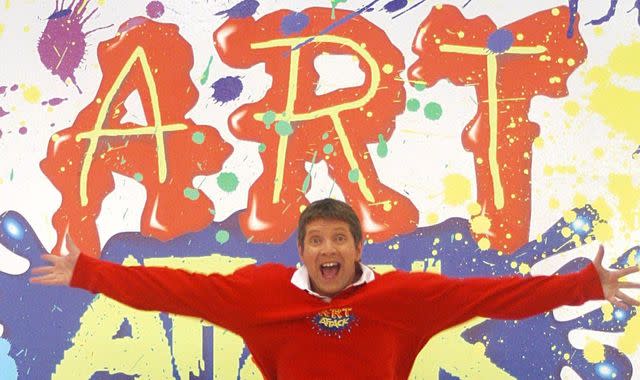Huw Merriman accuses Art Attack presenter of BBC 'bias' in apparent gaffe - as he lays into comedy show

A government minister has hit out at a BBC satirical show for being "completely biased" in the latest allegation from the Conservatives about the corporation's impartiality.
Huw Merriman also appears to have mixed up Art Attack presenter Neil Buchanan with BBC social affairs correspondent Michael Buchanan when challenged to give examples of unbalanced reporting.
The transport minister's comments came after Downing Street was forced to deny it is pursuing an agenda against the BBC, following a "culture wars" row over its impartiality reforms.
On Monday, Culture Secretary Lucy Frazer told Sky News the BBC has "on occasion been biased", but then struggled to give examples.
Mr Merriman, asked if he agreed with his colleague, told Sky News that an episode of BBC Radio 4 show The News Quiz last Friday had struck him as "completely biased".
"I was driving from my constituency office to home for 10 minutes and all I heard - and it wasn't satirical - was just diatribe against the Conservatives, not the government," he said.
"I did listen to it and think, for goodness sake, where is the balance in that?
"So, yes, I'm afraid to say, despite the fact I've always been a big supporter of the BBC, that struck me as completely biased."
When it was put to him that this is a comedy show, Mr Merriman said it did not strike him as particularly satirical and challenged any viewer to listen to it and make up their own mind.
He went on to criticise the BBC's coverage of universal credit, which he worked on during his time at the Department for Work and Pensions.
"There was an individual there who would report on it, Neil Buchanan, who I always felt gave one side of the story and not the other side, which was the government side."
Neil Buchanan hosted the children's TV show Art Attack between 1990 and 2007.
Mr Merriman may have been mixing him up with Michael Buchanan, a social affairs correspondent at the BBC.
The National Union of Journalists accused him of "scraping the barrel" and said it was "shameful" to single out individual journalists for criticism.
The debate on BBC impartiality has been brought to the fore by a series of reforms the government wants it to adopt.
As part of mid-term review into the corporation's Royal Charter, ministers want to give Ofcom, the media watchdog, more powers to investigate the BBC and a new legal responsibility to review more of the BBC's complaints decisions.
Ms Frazer said the BBC "needs to adapt" to the reforms or risk "losing the trust of the audience it relies on".
Read More:
Carol Vorderman to front new LBC radio show after leaving BBC over social media rules
But when challenged to give an example of bias she was unable to provide one beyond the BBC reporting of an attack on a hospital in Gaza which was initially attributed to Israel but which Western intelligence later concluded was the result of a misfiring Hamas rocket.
When it was put to her that a mistake is not the same as bias, she went on to say there is a "perception among the public the BBC is biased" and "perceptions are important".
The BBC said "no other organisation takes its commitment to impartiality more seriously".
Labour branded her the "latest secretary of state for culture wars" and accused her of using the BBC "as a punching bag".
Number 10 was later forced to deny it was pursuing an agenda against the BBC.
Rishi Sunak's official spokesman, asked if this was the case, responded: "No. This is rightly about ensuring the BBC is able to continue to thrive long into the future."


